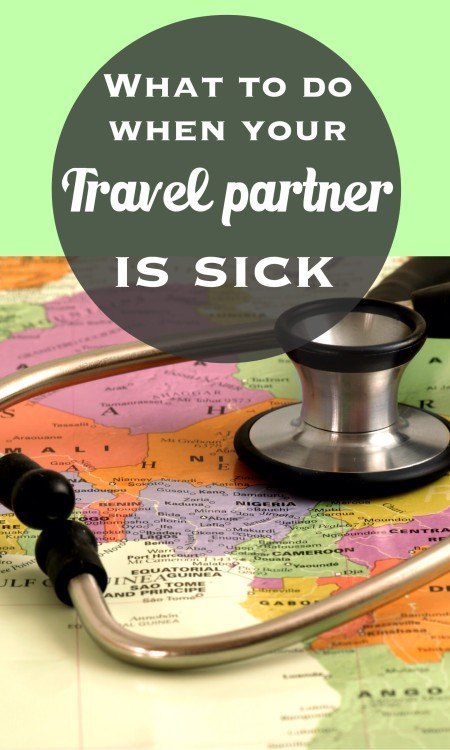Sponsored Listings:
One of the major advantages of travelling as a couple or with a travel partner is that you can support each other when something goes wrong. If one of you is feeling tired and overwhelmed, the other can take up the slack: order meals, make decisions, make sure nothing has been forgotten when it’s time to move on. This is similarly true when one of you gets sick — the other one is there to look after you.
To listen, hit play below or find episode 320 in iTunes, Stitcher or Soundcloud:
1. Be prepared
Although nobody wants to get sick while their travelling, you can lessen the impact by preparing for it in advance. You can do this from before you even leave home: get travel insurance and read your policy so you know what to do if you need to use it. Also, stock up your first-aid kit with necessities like painkillers, antiseptic cream, bandages, and plasters.
When you arrive in your destination, keep an eye out for the nearest medical centre, hospital, or pharmacy — you probably won’t need to use this information, but it’s helpful to know if you do.
2. Decide if it’s serious
If the sickness isn’t serious, you might just need some basic medicine or even just a few days’ rest. Be willing to negotiate and change your plans for the next few days, perhaps holing up in a hotel room to recover.
A pharmacy is a good first stop for medicine if you don’t have what you need in your first-aid kit; ask someone local (perhaps your couchsurfing host or hotel receptionist) for advice about which pharmacy to buy from. If you’re in a country where you don’t speak the language, take a local with you if possible. Failing that, work out what you’re going to say beforehand or draw pictures — whatever you can do to make sure you’re understood.
3. If it is serious
In an emergency situation, your first contact should be the people around you, then the country’s emergency phone number. Is it 111? 999? 158? Find out before you go. Your insurance company may also have an emergency contact line. Do you know what it is? Do you know how to call outside of the country you are in? These are all important questions to answer and it’s a good habit to find and review that information whenever you cross a border. Keep a card in the back of your wallet if you need to: be prepared.
Most of the time, however, it is the non-emergency situations that get us: a flu, food poisoning, a touch of depression caused by culture shock. It’s completely normal at home, but when someone can’t push through their sickness to keep to your itinerary, what do you do? Get angry that you’re missing the festival that you wanted to go to? Not the best plan!
The healthy one should make sure they’re balancing being “at home” with the sick one with getting outside and not going stir-crazy. Depending on the situation, it might be completely OK for you to leave them for a day or two and do your own thing while they lie in bed with a bad novel, a pile of painkillers and a bottle of water. As always: negotiate, be honest and be helpful.
4. In our case
During ten years of travel, we’ve had our share of sickness on the road, and almost never at the same time. It’s almost always just been a touch of food poisoning or a bad cold, solved by basic medicine that we could buy in the pharmacy or that we already had in our first-aid kit; we’ve found that loperamide is a life-saver for those times when we had to take long-distance buses but had eaten something unadvisable.
Occasionally we’ve had to head to the doctor when one of us was suffering an unexplainable pain or to be prescribed antibiotics for a persistent illness. We always go together to provide moral support for the other, and most of the time we end up staying put for a few extra days to make sure the sick one recovers completely. Sometimes it’s not possible to stop, like when I got sick in Bolivia just before our salt flat tour. In these cases, the healthy partner should do everything they can to help the sick one function.
Getting sick on the road isn’t fun for either of you, but it doesn’t have to ruin your trip.
This episode of the Indie Travel Podcast is sponsored by Context Travel.
Context provides private guides and (very) small group tours for the intellectually curious traveler. PhD and MA-educated guides take you deep into your destination, and with a maximum group size of six, you can ask as many questions as you like!
Find out more about Context Travel.
Want to support the Indie Travel Podcast? Buy your travel insurance, book your accommodation, or shop on Amazon after clicking these links. It doesn’t cost you any more but we get a small commission. Cheers!
Source: IndieTravelPodcast.com










